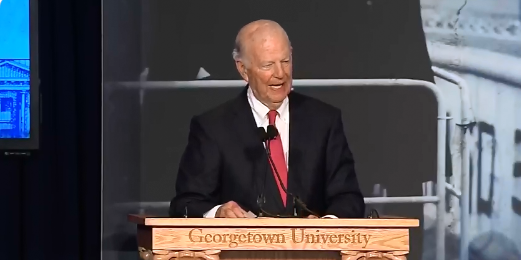Strong United States leadership alongside grassroots activism in Germany were key factors in the fall of the Berlin Wall, speakers said at an event in Gaston Hall on Nov. 6.
The event, titled “30 Years Later: Lessons from the Fall of the Berlin Wall,” featured three different panels of notable experts as well as introductory remarks from former Secretary of State James Baker. The panels focused on the events leading to the fall of the Berlin Wall, events that occurred on the day the wall was torn down and policy implications for the future.
After World War II, Germany was divided into four military occupation zones by the United States, the United Kingdom, France and the Soviet Union, with the eastern section occupied by the Soviets. From 1949 to 1961, about 2.5 million East Germans fled from East Germany to West Germany. In response to this mass immigration, East Germany erected the Berlin Wall in 1961 as a barrier to prevent skilled East German workers and intellectuals from leaving the region.
The fall of the Berlin Wall on Nov. 9, 1989 remains a remarkable event to this day because of its historical impact, according to Baker.
“I am confident that today’s lessons from the fall of the Berlin Wall will be an informative and useful examination of an historic event that led to the peaceful conclusion of the Cold War,” Baker said. “What happened three decades ago this week fundamentally changed the world.”

Panelists held varying views on the causes of the fall of the wall and the subsequent collapse of the Soviet Union, crediting the division’s end to domestic and foreign efforts.
President Ronald Reagan’s administration took a more hardline approach to American-Soviet relations compared to the previous George H.W. Bush administration, according to panelist Jeffrey Engel, founding director of the Center for Presidential History at Southern Methodist University. Reagan’s more aggressive rhetoric caused political leaders in the Soviet Union to become concerned, Engel said at the panel.
“Soviet policymakers heard Ronald Reagan, heard him talk about a crusade of fire, heard him talk about purging the world of communism, heard him talk about the communist state as being an evil empire and were genuinely worried that he meant what he said,” Engel said.
The United States played an important role in spreading liberal values to other parts of the world, according to Baker.
“Both President Reagan and President Bush realized that a large component of American strength was that we were the promoter and champion of a liberal world order,” Baker said.
In 1989, a series of revolutions in nearby European countries spurred East Germans to begin demonstrating for liberalizing reform. After weeks of sustained civil unrest, the East German government announced that citizens could begin visiting West Germany. Following the announcement, thousands of Germans gathered on both sides of the wall and guards at the wall opened the gate.
The grassroots action of individuals in East Germany and neighboring Soviet countries contributed to the fall of the wall, according to Baker.
“It was the indomitable spirit of those citizens of the captive nations that made possible our victory in the Cold War,” Baker said.
Both the Reagan and Bush administrations focused on developing strong relations with other foreign leaders and attempted to promote America’s interests and values around the world, and the current executive administration should do the same, according to Baker.
“The lessons that presidents Reagan and Bush provided during that critical window of history remain as pertinent today as they were back then,” Baker said. “As our nation continues to confront many daunting challenges, the foreign policies of Ronald Reagan and George H. W. Bush remain models that all American presidents would do well to follow.”
The event was part of the Georgetown University German department’s series of programming celebrating the 30th anniversary of the fall of the Berlin Wall from Nov. 4 to Nov. 9. Events include a weeklong poster exhibit in the Intercultural Center, student and faculty presentations and a “Tear Down This Wall!” cake party.
Ideologies transcend physical barriers, according to ambassador and former Under Secretary of State for Global Affairs Paula Dobriansky.
“The power of ideas can really make a difference, the moral narrative, the fact that fundamental human freedoms cannot be buried or blocked by any kind of wall or barrier,” Dobriansky said.




















